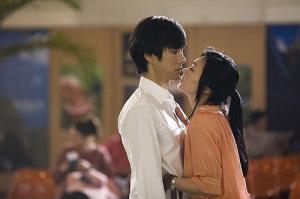I don’t know why, but about a month ago I went from almost never watching movies, to watching them pretty much every day. I discovered a, possibly boredom-driven, sense of curiosity that fueled my long, aimless treks through Netflix’s Instantwatch collection, genre-by-genre. At first I followed through on some specific recommendations, and then once I hit upon my niche (that sounds a bit trashy, but you know what I mean), I let my discernment take a back seat and well, my post-midnight lack of anything better to do take the wheel.
So last night while cruising my queue, I came upon a Japanese film from 2010 titled Sayonara Itsuka (Goodbye Someday), the cover of which rung wearily the much-overused-by-Japanese-directors bells of either a) love ruined by the early onset of some horrible disease or b) arufou chick-flick, that strange, house-wife-culture driven genre for bored women “around forty”. Neither of these being reasonable means of driving me away from the probability of wasting two precious hours of my life, I gave it a whirl.
Based on the novel of the same name by Hitonari Tsuji, Sayonara Itsuka follows the story of rising-star airline employee Higashigaito Yutaka who, 3 months before his marriage to totally objective opinion boring a-typical Mitsuko, is transferred temporarily to Thailand for work. While in Thailand, Yutaka meets fiery, fun Manaka Touko, with whom and you really can’t blame him he can’t resist starting a passionate, forgive-ably physical affair.
This may not make a difference to any of you, but I am currently developing a great appreciation of Korean films, for various reasons which solicit a lengthy analysis and comparison of their own which shall not be touched upon in this post. As much as I love them, though, I’m always torn because I have such a strong admiration for the Japanese, and the Japanese language. It was therefore, as you can imagine, exciting to discover that Sayonara Itsuka was actually directed by John Lee, a Korean director, produced by a Korean company, and released simultaneously in So. Korea and Japan.
 The film, not remotely soap-y as it would turn out, is reasonably predictable. The guy ships off to Thailand, meets a firecracker, they fall for each other and get it on and clearly he has prior obligations to marry the boring chick back home. What’s to guess?
The film, not remotely soap-y as it would turn out, is reasonably predictable. The guy ships off to Thailand, meets a firecracker, they fall for each other and get it on and clearly he has prior obligations to marry the boring chick back home. What’s to guess?
However, I shall dock no points for something so nit-picky.
The film itself was, to stereotype, as intriguingly directed and as exquisitely filmed as 4/5 of the Korean movies I’ve seen. I mean, you were there, in the oppressive Thai heat, the sultry sun, the dusty streets of Bangkok in some other era (It seemed like it was meant to be in the ’50s or something, but I could be severely off-track.). You could practically reach into the screen and touch and taste and smell the world Lee was portraying.
Although it’s all well and good to want to sink into Bangkok (especially on a day like today when you wake up to find snow everywhere. Somebody put me out of my misery.), Sayonara Itsuka isn’t a documentary on post-war Thailand. The musky, sticky world is made accessible and intoxicating to us because it has accessed and intoxicated its characters.
Wife of the original story’s author, Nakayama Miho portrays the alluring and irresistible Manaka Touko, who entices ambitious Adonis Yutaka (played by Nishijima Hidetoshi, whose “stone-face” and exquisite smile previously charmed certain people might be talking about myself, might not be in the, also Korea x Japan, drama Boku to Sutaa no 99 Nichi) out of the steamy sun and into the sumptuous yet fleeting world of illicit love.
The pair both have a stubborn, alluring attitude that worked well, building a clearly (yet elegantly) fragile chemistry, the likes of which you just wish you could take by the shoulders and give a good hearty shake until they acknowledge that they’re meant to be together and stay that fricken way. My one qualm about the story and the fact that it was based around this chemistry, is simply that the director didn’t just let the relationship carry the film. No, he had to go and click into epilogue overdrive.
Seriously, at 2.13 hours of viewtime I felt the whole thing sort of ran on and on and on, and honestly after about the 1.30 hour mark it felt like they started a whole new film about unfulfilled, depressed people who realize everything sucks (not exactly riveting material), I still think Sayonara Itsuka was a great movie. It depicted a very real dynamic of love, one that puts the head against the heart in an inevitable lose-lose situation, one that was brought to life by great, if a-typical, characters and exquisite cinematography.
 The film bore all the majestic characteristics of the awesome Korean drama/romance films I have had the pleasure of watching, while containing the emotional and thematic content of the more reserved, do-it-for-honor Japanese films from the genre. These qualities together made, I feel, a terrific cinematic context which satisfied all the chaotic yearnings of my cross-cultural conflictions.
The film bore all the majestic characteristics of the awesome Korean drama/romance films I have had the pleasure of watching, while containing the emotional and thematic content of the more reserved, do-it-for-honor Japanese films from the genre. These qualities together made, I feel, a terrific cinematic context which satisfied all the chaotic yearnings of my cross-cultural conflictions.
Just, seriously, after the 1.30 mark, fast-forward about 30 minutes. You won’t miss anything (Sorry, Lee).


